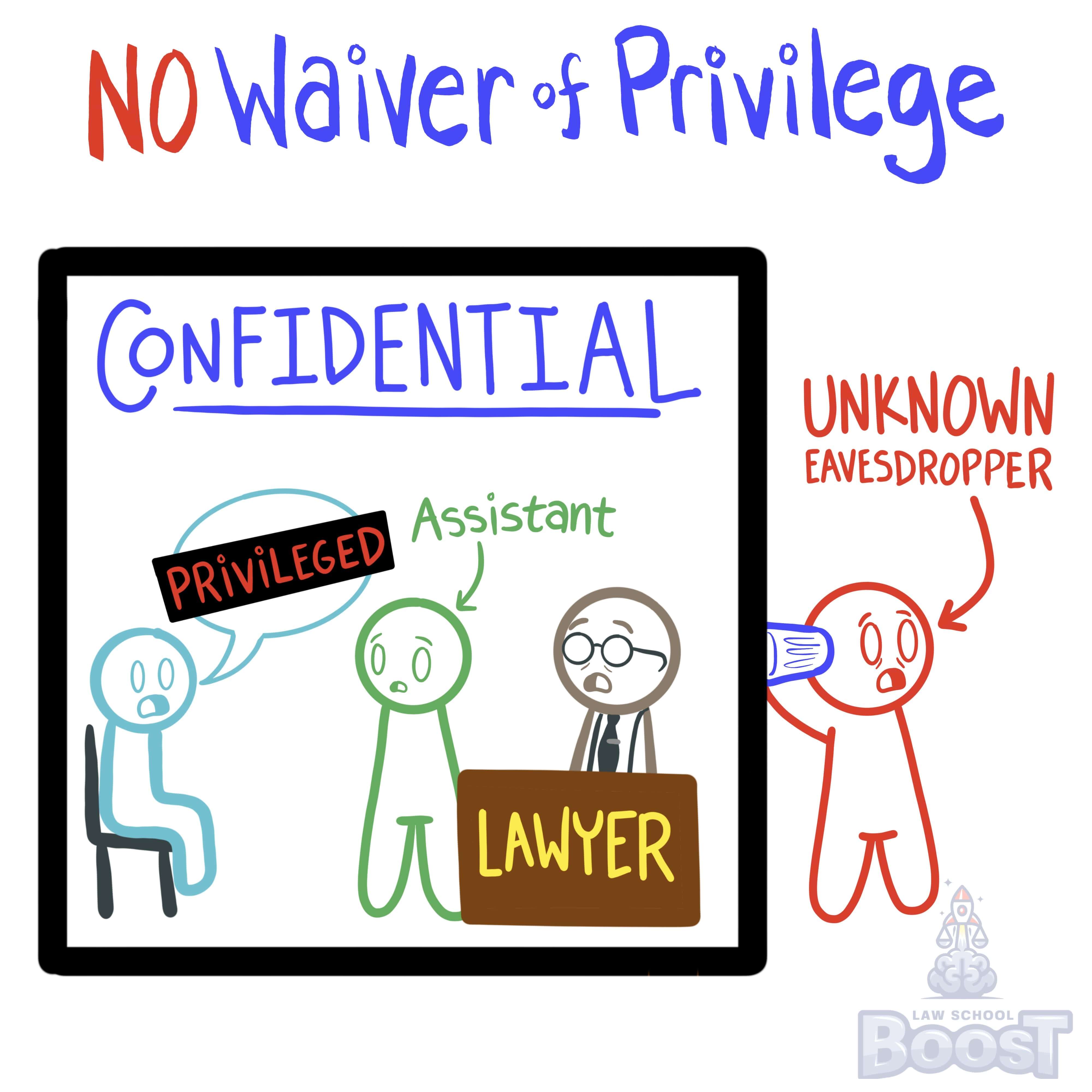🦅
Federal Evidence • Privileges
EVID#118
Legal Definition
There is no waiver if confidential communications are disclosed to a person to whom the disclosure is reasonably necessary for accomplishing the purpose of consultation or reasonably necessary to further the interests of the holder. Similarly, there is no waiver in the case of an unknown eavesdropper.
Plain English Explanation
The confidentiality privileges that protect certain communications in court have exceptions where disclosure does not waive the privilege. This exists because sometimes privilege holders need to share information with others to accomplish the purpose of a confidential task.
For example, a client may share privileged information with a non-attorney who is assisting the attorney, like a paralegal or expert consultant. Or a patient might allow a nurse to overhear details while being examined by a doctor. In these cases, the disclosure was reasonably necessary for the consultation, so privilege is retained.
Similarly, if someone accidentally overhears a conversation, like an unknown eavesdropper (when it was reasonable to assume no such eavesdropper would be present), no waiver occurs because the information was not intentionally shared. The law does not want to unfairly punish people when private communications are unavoidably overheard.
Overall, this rule aims to balance protecting confidentiality with allowing reasonable disclosures required in certain situations. It prevents privileges from being lost through technicalities or unavoidable accidents.
For example, a client may share privileged information with a non-attorney who is assisting the attorney, like a paralegal or expert consultant. Or a patient might allow a nurse to overhear details while being examined by a doctor. In these cases, the disclosure was reasonably necessary for the consultation, so privilege is retained.
Similarly, if someone accidentally overhears a conversation, like an unknown eavesdropper (when it was reasonable to assume no such eavesdropper would be present), no waiver occurs because the information was not intentionally shared. The law does not want to unfairly punish people when private communications are unavoidably overheard.
Overall, this rule aims to balance protecting confidentiality with allowing reasonable disclosures required in certain situations. It prevents privileges from being lost through technicalities or unavoidable accidents.
Hypothetical
Hypo 1: Bob tells his lawyer, Sam, about a mistake he made in his taxes because he needs legal advice. Sam keeps this information confidential. Result: Sharing this information with Sam does not waive Bob's privilege, as it's necessary for legal advice.
Hypo 2: While discussing a sensitive health issue in a private doctor's office, Bob's conversation with his doctor, Sam, is accidentally overheard by another patient waiting outside in the waiting room. Result: Bob's privilege is not waived because the overhearing was unintentional and unknown to Bob.
Hypo 3: While discussing a sensitive health issue in a busy waiting room, Bob's conversation with his doctor, Sam, is overheard by another patient in the room. Result: It wasn't reasonable for Bob to expect the person in the room not to listen and eavesdrop wile out in the open waiting room with other patients nearby, so privilege is waived.
Hypo 4: Bob discusses a personal matter with his therapist, Sam, and Sam's assistant, who is there to take notes, listens in. Result: The privilege is not waived because the assistant's presence is necessary for the therapy session.
Hypo 2: While discussing a sensitive health issue in a private doctor's office, Bob's conversation with his doctor, Sam, is accidentally overheard by another patient waiting outside in the waiting room. Result: Bob's privilege is not waived because the overhearing was unintentional and unknown to Bob.
Hypo 3: While discussing a sensitive health issue in a busy waiting room, Bob's conversation with his doctor, Sam, is overheard by another patient in the room. Result: It wasn't reasonable for Bob to expect the person in the room not to listen and eavesdrop wile out in the open waiting room with other patients nearby, so privilege is waived.
Hypo 4: Bob discusses a personal matter with his therapist, Sam, and Sam's assistant, who is there to take notes, listens in. Result: The privilege is not waived because the assistant's presence is necessary for the therapy session.
Visual Aids



